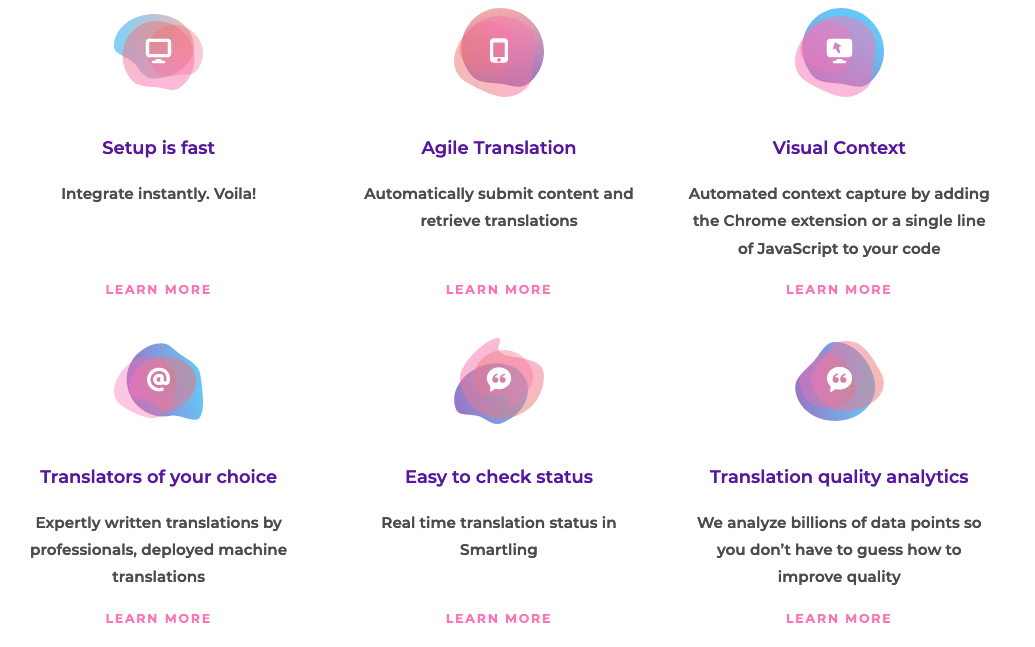With so many different translation tools and plug-ins available to WordPress users, it can seem as if translating an entire website would be a breeze.
Relying solely on independent WordPress plugins could serve well for smaller scale operations, but may introduce a noticeable amount of friction when brands are looking to localize their entire website or existing backlog of content.
By leveraging Smartling within WordPress, users can transform their entire content management and translation process in a way that standalone plugins cannot.
Why Smartling?
WordPress is an open source CMS. One major benefit of an open source platform is that there is no shortage of independently developed solutions for literally every single problem you can think of. But, that doesn’t mean it is going to work within your existing environment.
Hence why it is so critical for businesses to find the right vendor that is both properly credentialed, and proven through real-world use. With our integration to WordPress, users can quickly and easily translate Posts, Pages, Categories, Tags, Theme Widgets, and Navigation Menus.
Since the platform can integrate directly with WordPress, Smartling will transform the entire Translation Management process with:
- Automatic download of completed translations to WordPress
- Automatic change detection for content updates
- Translation Memory integration
- Robust custom workflow engine configurable per language
- Visual Context so translators can see exactly how their work fits into the content
- Data at every single touchpoint for robust process optimization
In short, Smartling offers three major benefits:
- Technology - Smartling can support a large number of different available plugins, site structures, and delivery mechanisms. The platform also introduces a wide range of technology not available in other plugins or tools, like our powerful Automated Translation functionality.
- Translation Options - Smartling is not only a technology provider, but also a translation services provider capable of supporting multiple different content types.
- Simple and Optimized Process - When leveraging Smartling, translators never need to login to someone's Wordpress instance, eliminating the complexities of WordPress management that can simply slow down the process. Translators still retain the ability to work within context, as well.
Challenges of Wordpress Translation Management
As we mentioned, independently developed solutions for WordPress can introduce new complexities into the process. Some plugins may be limited in their support for different translation options, and others may only provide support for managing content with no translation services included.
Ultimately, businesses utilizing independent WordPress plugins as a substitute for a dedicated Translation Management System will be missing some incredibly helpful features.
The simple concept of bundling content for translators to work on, submitting completed jobs, and uploading the content to WordPress can quickly become time-consuming and complex. So, instead of emailing spreadsheets and losing all context for translations, let Smartling help.

Smartling makes it incredibly easy for users to manage their content within any CMS thanks to powerful automation.
Now matter how you integrate WordPress with Smartling, the content is automatically sent from your environment to Smartling, where professional translators can convert the language; and, when that’s complete the translations can be deployed to your end user.
No more juggling spreadsheets and emailing copies. No more emailing with linguists about questions (you can chat with translators on the string level in Smartling).
The Limitations of WordPress Translation Plugins
When it comes to the available WordPress plug-ins specifically, there is a lot left to be desired. Some plugins are more well-rounded and may even include rich management functionality, as well as access to Language Services -- but that doesn’t mean they will play nicely with each other, or with your existing tools.
There is a lot to think about before jumping right into an entire translation process, and that’s why a dedicated Translation Management System is so critical. Some factors you might want to consider include:
- Formatting and context
Does the plugin provide users with an in-context translation processes, enabling the expert to consider overall context, formatting and design? If not, this could dramatically slow the process, and require redesigns or double translation efforts to ensure consistency.
- Management and optimization
How will content be managed, and who will have access to the platform? Can administrators or managers automate tasks surrounding translation to speed up and optimize the process? How deep is the management functionality, and how can users leverage the tool to improve translation quality?
- Automation
Can users leverage powerful automation to save critical time on repetitive tasks. For example, Smartling enables users to setup real-time Quality Checks, which can catch minor errors as the content is being translated.
Of course, much of this will differ based on the unique needs and requirements of each use-case. However, we think that no translation job is too small for Smartling.
When translating any content, quality must be the first concern. The need for a complete service to help manage content, and automate the entire translation process, will not only help maintain but can even work to improve the quality of translations, and shrink the time it takes to launch new content.
Smartling Works With Your Brand
Part of the beauty behind the Smartling platform is flexibility. Smartling can integrate with an existing platform in two major ways:
Native Integrations
Native integrations provide a quick and easy setup, and make it easier for users to jump in and feel right at home by leveraging the tools they’re already familiar with.
For example, by integrating WordPress with Smartling, users are able to automatically submit content and retrieve translations on the platform through Smartling’s custom workflows.

Smartling Global Delivery Network (GDN)
On the other hand, the GDN Translation Proxy is a great option for brands that may be light on developer resources or have various complexities to their WordPress website, but need to quickly deploy localized content.
Users do not have to build their own website copies, or source global network services, instead that is handled on our end through the proxy. When users request content from a different location, the proxy will recognize that request, and display the correct localization copy of that content.
We're Here to Help
Finding the right match isn’t as scary as it sounds, either. Smartling has customers who use WordPress solely with our native integration, customers that rely directly on the GDN, and even customers who find that a hybrid approach works best.
Our Smartling Sales Engineers work very closely with your organization’s existing content management process, as well as the end-goal for localized content, to determine the right path to take each specific use-case.
The Bottom Line
Leveraging Smartling to translate WordPress content can ultimately revolutionize the way your brand is managing, translating and optimizing around localized content.
From powerful CMS integration and automation, to deep analytics to uncover optimization opportunities, Smartling will help your business both improve translation quality and efficiency at the same time.
About Matt
Matt Grech is the Content Marketing Manager at Smartling, responsible for growing Smartling awareness and brand content. As a digital content writer, Matt applies his journalistic lens to content, helping users deepen their understanding of the brand, services and technology provided by Smartling. Matt has previously contributed to an industry leading Unified Communications resource, as well as local newspapers where he developed his unique ability to investigate, interview, and transform complex problems into simple solutions.
%20052925%20-%20AI%20Translation%20101%20(1).png)
.jpg)